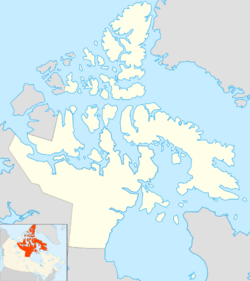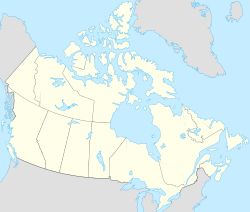Twin Islands (Nunavut) facts for kids
| Geography | |
|---|---|
| Location | Northern Canada |
| Coordinates | 53°10′N 79°55′W / 53.167°N 79.917°W |
| Archipelago | Canadian Arctic Archipelago |
| Total islands | 2 |
| Major islands | North Twin Island and South Twin Island |
| Area | 301 km2 (116 sq mi) |
| Highest elevation | 60 m (200 ft) |
| Administration | |
|
Canada
|
|
| Nunavut | Nunavut |
| Region | Qikiqtaaluk |
| Demographics | |
| Population | Uninhabited |
| Ethnic groups | Cree |
The Twin Islands are two islands in Nunavut, Canada. They are found in the middle of James Bay. The local Cree language name for them is Mah-Nah-Woo-Na-N. These islands are part of the Qikiqtaaluk Region in Canada's Arctic area. The group includes two main islands: North Twin and South Twin.
Contents
Geography of the Twin Islands
The two islands are about 11 kilometers (7 miles) apart. North Twin Island is the bigger one, located to the northwest. It is about 18.5 km (11.5 miles) long and 11 km (7 miles) wide. Its total area is 157 square kilometers (61 square miles).
South Twin Island is smaller. It measures about 12.8 km (8 miles) long and 10.2 km (6.3 miles) wide.
The islands have different types of land. You can find loose sand and gravel, along with lakes and marshy areas. There are also sand dunes and wide, flat areas that are covered by water during high tide. Important spots on the islands include Cotter Point on North Twin and Lucy Point on South Twin.
Plants and Trees on the Islands
Even though the islands are in the Arctic, they have some small groups of trees and plants. You can find dwarf birch trees and juniper bushes. There are also white spruce trees and different types of willows. The islands are home to heaths and other shrubs too.
Protecting the Twin Islands
The Twin Islands are very important for nature. They are recognized as a Canadian Important Bird Area (IBA). This means they are a key place for many bird species.
The islands are also part of the International Biological Program and a Key Habitat Site for birds that travel long distances. The Twin Islands Wildlife Sanctuary helps protect these special places. It is part of the larger James Bay Preserve.
Animals and Birds of the Twin Islands
Many different kinds of birds live on or visit the Twin Islands. Some of the notable bird species include:
- American pipit
- Arctic tern
- Canada goose
- Dunlin
- Eastern white-crowned sparrow
- Horned lark
- Lapland longspur
- Least sandpiper
- Purple sandpiper
- Red-necked phalarope
- Savannah sparrow
- Semipalmated plover
- Semipalmated sandpiper
- Various waterfowl (ducks, geese, etc.)
- Willow ptarmigan
Besides birds, polar bears are also often seen in the area around the Twin Islands.
 | Audre Lorde |
 | John Berry Meachum |
 | Ferdinand Lee Barnett |



